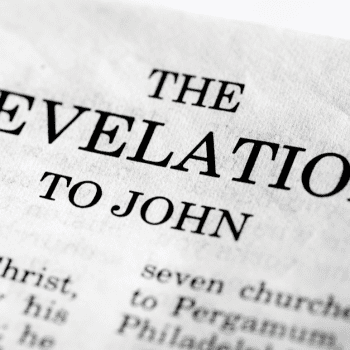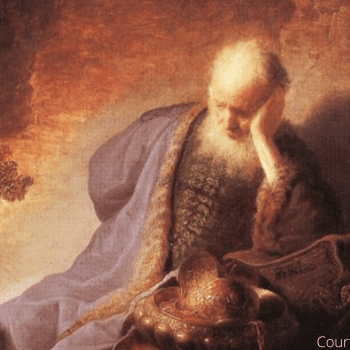Monday: Read Galatians 3:15-29
The question that Paul is addressing in the chapter is: “who constitutes the children of Abraham?” Are we children of Abraham because we follow the Law? Remember, “following the Law” means that we do the things that distinguish Jews from Gentiles: namely, circumcision, food laws, and Sabbath keeping. Or, are we children of Abraham by faith in Jesus Christ?
One of the keys to understanding Paul’s argument is that he concludes by arguing that what is true of the Messiah is true for us. Thus, he closes this chapter with, “And if you belong to Christ, then you are Abraham’s descendants, heirs according to promise” (29).
In 15-17, Paul argues that the promise came to Abraham hundreds of years before the Law (15-17). Therefore, the law cannot set aside the promise to Abraham by making obedience to the Law (i.e., becoming Jewish) a prerequisite (15).
Paul then argues that God’s grand plan for all of humanity has been accomplished in Christ and all may participate through faith (22-24).
The result is that God has formed a single family (26-29). In this family, we are all heirs with Abraham (29). And in this family, there are no longer ethnic distinctions (Jew v Gentile), socio-economic distinctions (slave v free), or gender distinctions (male or female) (28).
Questions to ponder/discuss:
- It is easy to say that we are one in Christ Jesus but it seems that it is much harder to actually practice. Unfortunately, there are many in our church communities that do not believe they are equal with the rest of us. Some of those that I can think of include (this is not to say that this list is true in every church): women, the elderly, handicapped, single, divorced, people of color, and those who are poor. Can you think of others?
- Make an effort to seek out others and listen to their stories as to why they do not feel as though they are considered equals.
Tuesday: Read Galatians 4:1-31
In chapters 1-3, Paul works out the controversy with the Galatians in terms of whether one joins the family of God’s people by faith in Jesus or by becoming Jewish.
In this chapter, Paul argues based on one’s commitment to the temple. Now that the fulfillment has come in Jesus, Paul asks, why would anyone turn back?
Christ has come, Paul argues, to redeem us from slavery so that we might become children of God (5-7). For Paul, reverting to the standards of entrance into the kingdom based on the Law (Jewish identity markers) is no different than a freed slave returning back to slavery (8).
Paul completes his argument with an allegory in which Hagar and her son Ishmael are contrasted with Sarah and her son Isaac. The distinction between the two which Paul highlights is that Ishmael was born as a result of Abraham and Sarah’s taking matters into their own hands (i.e., “according to the flesh”), while Isaac was born as a result of the promise (23).
Questions to ponder/discuss:
- Paul’s concerns here lead to several debates among Christians. Unfortunately, many have decided that since salvation is not through the Law that the Law is not important. The NT, however, stresses that in Christ the Law is fulfilled. Jesus said that He didn’t come to abolish the Law. For Paul, the issue was how does one enter the family of God. We, however, have made it a debate on what we do as the people of God. For the NT, the people of God fulfill the Law by loving God and loving others as the Spirit equips us to do so.
- How much do you study the OT law? How much do you concern yourself with living it out each day?
Wednesday: Read Galatians 5:1-15
The beauty of the book of Galatians and its application for us today is found in chs 5-6. The issues have been: how does one become a member of the people of God (through circumcision and the Law, or by faith in Christ)?; and how do the people of God govern their lives (through the Law or the Spirit)?
Paul now applies his message to their situation. He begins by stating: Do not use your freedom as a license to sin (13)! Paul’s concern has been that the Galatians were “so quickly deserting Him who called you by the grace of Christ, for a different gospel” (1:6), and now some false teachers have come and “hindered you from obeying the truth” (5:7).
The problem is that they have allowed false teachers into the community—likely because the false teachers were saying what they wanted to hear. When Paul says “a little leaven leavens the whole lump of dough” (9; 1 Cor 5:6), he means that a little false teaching can corrupt the entire body. Jesus similarly warned, “Beware of the leaven of the Pharisees and the leaven of Herod” (Mark 8:15).
There is no higher virtue for Paul (or the Scriptures) than love. Love manifests itself in how we treat others. Thus, Paul says that what matters is “faith working through love” (6). Then he cites Lev 19:18 and claims, “the whole Law is fulfilled in one word, in the statement, “You shall love your neighbor as yourself” (14).
Questions to ponder/discuss:
- It would not only be really poor theology, but it would also be really bad teaching if we were to read Gal 5:1 and conclude that since we are free in Christ and no longer under the Law, we are free to do as we please. Though I doubt that many actually teach this today, I suspect that many practice it. This often results from a poor understanding of salvation. The idea is that if we are saved by faith and not by works, then we are free to do as we please—lest we stress “works”—is as dangerous as the teaching that we are saved by works. What do you think is the role of works in Christianity?
Thursday: Read Galatians 5:16-26
The role of the Spirit is central to Paul’s theology. Many of the rabbis of the day argued that Torah (Law) was the key to overcoming sin. This is not necessarily wrong. It is just not complete. Paul responds by claiming the Spirit fulfills the role of the Law as God’s moral guide. And what this looks like is a life of loving others.
This passage is famous for Paul’s contrast between the Works of the flesh (19-21) and the Fruit of the Spirit (22-23).
Paul’s lists are not arbitrary. As Paul sees it, if we want to be part of the new creation, then the works of the flesh will disqualify us. After all, if God is bringing about a world of justice, then there is no place for drunkenness and carousing. And if God is bringing about a place of peace, then there is no place for envy, strife, and quarreling.
The fruit of the Spirit is the essence of the new creation. This means that this is what, by the Spirit, we are becoming. As one writer says, “You can tell the one who has the spirit of God by their way of life.”[2]
It is important to note that “fruit” is singular (22). Some have suggested that this is because the one fruit is love and the rest of the list simply details what love looks like. This may be so (even if it is not what Paul was trying to say, it is still basically true).
Questions to ponder/discuss:
- The role of the Holy Spirit is not stressed enough in most Christian communities. For Paul, the presence of the Spirit in the life of the Galatians was proof that membership into the family of God was through faith (see 3:2). Now Paul urges them to “walk by the Spirit” (16). The key is that when we live by the Spirit we “will not do the things that you please” (17). This is again what love looks like. Love demonstrates concern for the other and a willingness to lay down one’s desires and even one’s life for others. The flesh, however, desires to gratify itself.
- Examine Paul’s list of works of the Law and fruits of the Spirit and ask, “which fruit do you need to manifest more of?” Then ask the Spirit daily to guide you and equip you to walk by the Spirit in order that you might manifest the Fruit of the Spirit.
Friday: Read Galatians 6:1-18
In 6:1-10, Paul provides an application of his teaching on the deeds of the sinful nature and fruit of the Spirit. Paul provides concrete examples of what it means to live as an individual Christian within the community of God’s people.
Paul states, “Bear one another’s burdens, and thereby fulfill the law of Christ” (2). He then adds that each, “must examine his own work” (4). When he states that “The one who is taught the word is to share all good things with the one who teaches him” (6), he is making a parenthetical insertion that follows from his command that “each one will bear his own load” (5)—lest anyone determine that “bearing his own load” means that pastors and teachers should not be paid (remember that Paul refused to take money for his work, so he is certainly not saying this for his own benefit).
When Paul says that we reap what we sow (7-8), he is asserting a proverbial truth that continues to manifest itself. For Paul, this is not karmic debt in operation. Instead, it is a fulfillment of a reality that if we sow for the kingdom, we will reap kingdom/eternal benefits.
Scot McKnight summarizes this passage: “while works do not save us, no one is saved without works. Why? Very simply, because works are the sure indicators of a person’s heart, orientation, and status before God. Every judgment in the Bible is a judgment according to works.”[3]
Paul concludes his letter in 11-18. In this conclusion, he offers a summary, “For neither is circumcision anything, nor uncircumcision, but a new creation” (15).
Questions to ponder/discuss:
- I think we might summarize Paul this way: If we truly believe in the coming of the New Creation, and in the fact that it is already here in part, then we will live according to it. What does this look like for Paul? 1) a life of reliance on the Spirit; 2) a life that manifests a sacrificial love for others. How much do you struggle with living in this world and according to its principles than living by faith in the Spirit?
Our goal is to keep these posts free of charge. I do not intend to ever hide them behind a paywall. I can only do this if those of you who have been blessed by them and can afford to give ($5, $10, $25, or more/month) do so. You can give a tax-deductible contribution by following this link.
Please share this post and let others know about determinetruth.
If you wish to view this blog on your smartphone through the Determinetruth app simply download the “tithe.ly church” app on your smartphone and insert “determinetruth” as the church name you wish to follow. Once it is loaded, simply click on the “blog” icon and it will automatically load.
If you would like to have Rob speak at your church or organization in person or via zoom, please let us know by filling out the contact info on the Contact me tab on this site.
[1] This guide is meant to be done either as a group study over the course of 2 or 4 meetings (Day 1-5; 6-10; 11-15; 16-20), or as a private devotion over the course of 4 weeks (or a calendar month—5 lessons per week).
[2] Kreider, Alan. The Patient Ferment of the Early Church: The Improbable Rise of Christianity in the Roman Empire (p. 196). Baker Publishing Group. Kindle Edition.
[3] McKnight, Galatians,
















